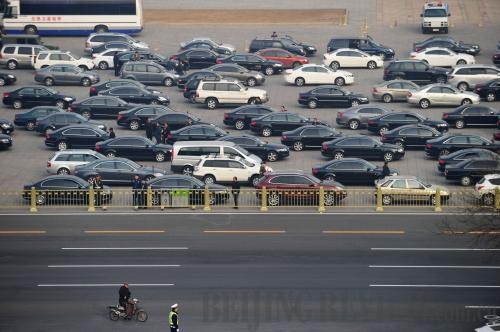|
 |
|
BIG FLEET: Officials park government vehicles in Tiananmen Square during the national legislative session in Beijing on March 7 (WEI YAO) |
China's foreign minister has driven a domestically manufactured sedan since June 17. Wang Yi chose as his official government vehicle the same brand of car once driven by China's founding fathers .
The ministry's announcement was welcomed by domestic automakers and won praise online for restarting a long-stalled plan to compel government officials to eschew the purchase of foreign luxury cars using public funds.
The First Automobile Works Group Corp. (FAW) markets the Hongqi H7, priced from 299,800 yuan to 479,800 yuan ($49,000-78,000), with top government officials specifically in mind. More than 1,000 have been purchased by government departments, said Zhang Xiaojun, President of FAW's sales subsidiary, who reports a more modest figure for individual purchasers.
"Government officials should have been using domestic cars even earlier," said Huang Shengmin, Director of the School of Advertising at the Communication University of China in Beijing. Huang noted that the move could set an example for other consumers and promote the once-weak domestic auto industry.
Most of China's official cars are foreign brands, despite a 2002 procurement law stipulating the purchase of domestic models.
"The government vehicle market is still dominated by foreign brands such as Audi. Homegrown brands account for only 10 percent," said Zeng Zhiling, Director of Asia Pacific Forecasting at LMC Automotive, a global automotive industry research group headquartered in Britain.
President Xi Jinping called on officials to gradually shift toward domestic car brands in December 2012. A month later, acting as general secretary of the Communist Party of China, he urged all Party organs and members to practice frugality.
Brand switch
The Ministry of Industry and Information Technology released a list of approved vehicles for government procurement in February 2012, which included 412 models of domestic cars. Audi, Volkswagen, Toyota and other foreign brands were absent despite inclusion in a similar list in 2009.
Ren Jianming, a professor at Beijing University of Aeronautics and Astronautics, said that exclusive procurement of domestic vehicles for official use is not unique to China.
"It is a good method of promoting domestic brands and increasing consumer confidence in local products," said Ren, adding that previous efforts lacked effective supervision and enforcement.
"Consumers may be able to choose between a domestic brand and a foreign brand, but government procurement, which uses taxpayers' money, should be limited to domestic products," said Wang Yong, Secretary General of the Beijing-based non-governmental Brand China Industry Union.
Local governments have also turned to domestic brands.
Last year, the Fujian Provincial Government bought 72 Besturn B90 sedans, according to Cui Dayong, a senior sales manager at FAW.
Other domestic brands, such as the Trumpchi produced by the Guangzhou Automobile Group and the Roewe 950 of the Shanghai Automotive Industry Corp. (SAIC) Group, have also made their way into the official vehicle market in Guangdong, Zhejiang, Jiangsu and Shandong provinces.
According to a June 23 report from The Beijing News, the Beijing Automotive Group has sold more than 100 Senova cars to several government agencies in the capital as well as the municipal Party committee.
Also in June, the SAIC Group received an order for 150 Roewe cars from the General Administration of Customs.
SAIC's government orders increased by 109 percent in 2012 and the number is expected to grow by another 115 percent in 2013, China Business News reported.
While the moves by central and local governments have won media praise, some experts warn against dramatic changes in government procurement.
"In many cases, government agencies rush to purchase domestically made cars without considering their own budget conditions. This can easily lead to extravagance," Ren said.
According to a budget released by the Ministry of Finance in April, central government agencies will spend 4.4 billion yuan ($717 million) this year, 1.77 billion yuan ($289 million) less than in 2010.
| 